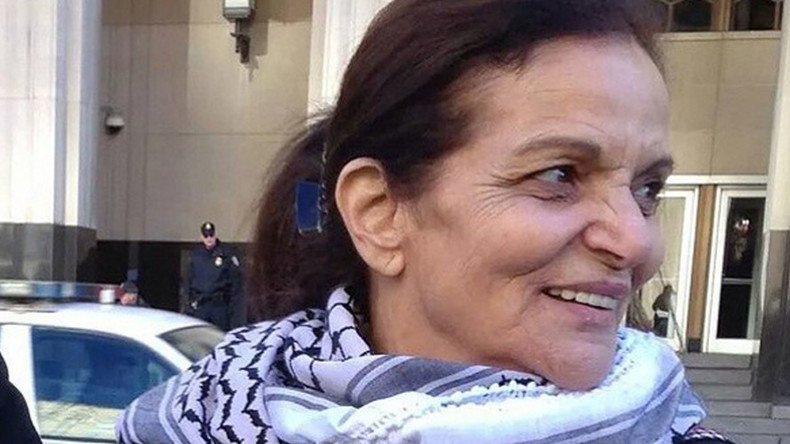#Justice4Rasmea: Palestinian activist’s supporters light up social media

Palestinian activist Rasmea Odeh was trending on social media after her supporters started a campaign calling for justice as she awaits a decision on her appeal.
Free #RasmeaOdeh & all political prisoners! #Justice4Rasmea today! pic.twitter.com/9bMkD2TJK5
— War Resisters League (@resistwar) January 27, 2016Justice delayed is justice denied. We demand #Justice4Rasmea and all political prisoners @uspcn@Justice4Rasmea
— Bassem (@kawarb1988) January 28, 2016Odeh was arrested in the US in 2014, where she worked as an attorney in Chicago, and faced trial for falsifying immigration documents.
“I love my teacher" says 1of the 100s of women Rasmea mentored in Chicago https://t.co/StTLdZS2D7#Justice4Rasmeapic.twitter.com/uwwguceeM6
— Justice4Rasmea (@Justice4Rasmea) January 28, 2016In 2004, after living in the US for 20 years, Odeh failed disclose her 1969 imprisonment in Israel when filling out her naturalization papers. Odeh says she didn’t mention it as she thought the question referred to US arrests and did not think of her imprisonment in Israel due to PTSD.
#Justice4Rasmeapic.twitter.com/jUSdXd4zWl
— Osama Mor أسامة مر (@bitter_yattawi) January 28, 2016Odeh was imprisoned in Israel for allegedly bombing a supermarket in 1969. She says she confessed to the crime under torture by Israeli soldiers, who she claims raped and threatened her.
After 25 days of heinous torture she signed a forced confession. #Rasmea denounced her confession and faced trial in Israeli Military Court.
— The Chicago Alliance (@NAARPR) January 28, 2016#Justice4Rasmea A Palestinian Hero!
https://t.co/d124Bw5mWp@uspcnpic.twitter.com/VHEilPd3UI
— Catherine Strout (@stroutcw) January 28, 2016The judge in the original immigration trial refused to hear evidence on the torture claims or her PTSD, but heard evidence by the Israeli military court who had convicted her.
According to Odeh, she was subjected to beatings, electric shocks and witnessing a male prisoner being tortured to death. She also claims the Israelis said they would force her father to rape her, which led to her agreeing to confess.
@ICEgov: hands-off Rasmea Odeh. NO! to Rasmea's deportation. #Justice4Rasmea#Not1Morepic.twitter.com/qbMTgkq4vl
— Catherine Strout (@stroutcw) January 28, 2016Rasmea marching against Friends of IDF fundraiser 2014 #Justice4Rasmea@iosbakerjoe@uspcn@AMPalestine@ChicagoJVPpic.twitter.com/nbXmEQq9Yw
— Bill Chambers (@Chgofenian) January 27, 2016The current appeal challenges the decision to jail Odeh for 18 months and then to deport her to Jordan, arguing the trial was unfair.
Supporters prepare for decision on Rasmea Odeh's appeal https://t.co/rHp0rvk8D9 via @P_i_A_Mag#Justice4Rasmeapic.twitter.com/6xiB4H4vgA
— Joe Catron (@jncatron) January 28, 2016The trial has been called a ‘witch hunt’ by those who believe Odeh’s case is part of an FBI clampdown on anti-war activists that began in 2010.
Angela Davis calls for an end to “witch hunt” against #Palestinianshttps://t.co/hwrInPaQzP#Justice4Rasmea#BlackPalestinianSolidarity
— Justice4Rasmea (@Justice4Rasmea) January 28, 2016#Justice4Rasmea The Lady With Honor. Refuses #World Wide #ZionismTerror
https://t.co/awOosUGX39pic.twitter.com/pbnW08sAFV
— Khalil Alzamer (@zmerkh) January 28, 2016Angela says end witch hunt against #Palestinianshttps://t.co/uoSwhXIcY5#Justice4Rasmea#BlackPalestinianSolidaritypic.twitter.com/BOjERYiVMN
— USPalestinianNetwork (@uspcn) January 28, 2016"Rasmea is under attack because she is Palestinian, Arab and Muslim, because U.S. law enforcement is going after our successful Boycott, Divestment, Sanctions movement against Israeli apartheid, and because she embodies the proud and steadfast Palestinian struggle for self-determination, liberation, and the right of return,” Hatem Abudayyeh, a member of Odeh’s defense said in late 2014.
McQuade @USAO_MIE & Tukel (dont want him to think we've forgotten): The world is watching, we demand #Justice4Rasmeapic.twitter.com/PWg8bv5hjS
— USPalestinianNetwork (@uspcn) January 28, 2016Rasmea should be honored, not imprisoned #Justice4Rasmeahttps://t.co/a1CNt3bXGK by @ramahkudaimi of @US_Campaignpic.twitter.com/K7JvwzDXbT
— USPalestinianNetwork (@uspcn) January 28, 2016Some social media users used the campaign to share their views against Odeh.
@Justice4Rasmea@ChicagoRising The arab terrorist Rasmea Odeh earned herself a deportation from the US. Give her what the US is due to her.
— Zyggy (@fruedz) January 26, 2016Why is @jvplive celebrating and glorifying a convicted Jew-killer? #Justice4Rasmea#RasmeaOdehpic.twitter.com/qKBYNQSw3I
— Anarcho-Zionist (@AnarchoZionist) December 13, 2015Wednesday remember to tweet in memory of the victims of #RasmeaOdeh using the hashtag #Justice4Rasmea. pic.twitter.com/KaBiNgRWLC
— Anarcho-Zionist (@AnarchoZionist) January 27, 2016Odeh was released from Israeli prison in 1979 as part of a prisoner swap. She spoke at the UN that year, detailing her treatment in Israel. She then lived in Jordan and Lebanon before moving to the US in 1995 to care for her father. She became involved in the Arab American Action Network and works with many Arab women who come to the US.
Rasmea thanks all who took part in #Justice4Rasmea campaign! Emergency Response https://t.co/leAhQqrZZG. Good Night! pic.twitter.com/HSq5a7CiKQ
— USPalestinianNetwork (@uspcn) January 28, 2016











